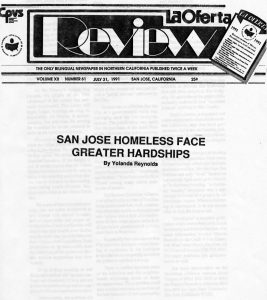July 31, 1991
By Yolanda Reynolds

Homeless citizens and their advocates marched through downtown San Jose last Saturday morning. The “March for Dignity” which began at the Julian street lnn a facility for the homeless, ended with a demonstration and bag lunch at Plan Park, opposite the Fairmont Hotel, at noontime.
The group of approximately 150 homeless advocates were seeking an end to the renewed police sweeps of homeless encampments in the downtown area.
The marchers were also asking that San Jose leaders built low income housing, not stadium and luxury hotels and that the county not make cuts in services for homeless during upcoming budget discussions.
As the County’s budget has shrunk, the plight of the less advantaged in the county will begin budget hearings on Aug. 6. Reportedly, the County is recommending that priorities for serving the homeless be further reduced in order to cut social services costs.
On such recommendation is to close the Julian Street homeless facility during the day. The Julian Street facility serves the mentally ill and disabled homeless. If the budget is cut, it would require that the Julian Street clients be evicted to the streets early in the morning until either dinner time or bed time in the evening. Cost cutting would eliminate daytime supervision as the Julian Street Inn.
For many of these homeless persons, who are under medication to help control their mental illnesses, lack of supervision and proper administration of their medication will deteriorate their health even further and, for some, may result in behavior that will place them behind bars. Both alternatives are far more costly than the initial cost of the somewhat limited daytime supervision they now receive.
Many of these mentally ill and disabled homeless will become confused and disoriented if they are not in familiar surroundings and not supported with a structured environment.
Unfortunately, the problem for the homeless is becoming more acute just as community interest is being diverted by the many issues confronting the taxpayer at this time. There are new taxes, jobs have become scarce and the economy is limping along.
The leaders of the Saturday’s march say that priorities in the city must change. Saturday, the plight of the homeless stood out in dramatic contract to the luxuriousness of the Fairmont Hotel. In recent weeks, the owners were paid $5 million for the main floor this was in response to the owner’s complaint that the city of San Jose had not helped them as promised. The City of San Jose (represented by the Redevelopment Agency Board) originally gave the owners of the Fairmont Hotel a $30+ million subsidy to build the hotel in San Jose. Much of the interior art was paid for with a “public arts tax” collected by the City.
In response to criticism that the City as a governmental entity was infringing upon the free enterprise system. The justification was made that the purchase of the main floor of the Fairmont was just a courtesy to hotel patrons and should not really be considered a money making venture.
It is such actions that the Student Homeless Alliance is protesting. Placards at the demonstration read “Housing for People not profit,” “Healthcare not Welfare,” “New Priorities for New Times” among many others statements of protest.
The Student Homeless Alliance is an alliance of a number of San Jose State student and their staff, community advocates and homeless persons who believe that a lack of consideration for low wage earner, and a lack of appropriate governmental policies contribute to homeless.
Repeatedly there are reports that City promises for replacement housing or assistance to the homeless evaporate almost as quickly as it takes the police to conduct a sweep.
There is conflict between some of the homeless and the neighborhoods adjoining some of those encampments. These problems will only escalate as pressures increase on the less fortunate of our community.
One of the homeless participants in Saturday’s march said that he had two jobs, but still did not make enough to afford the cost of a room in town. He works from 9 in the morning until midnight every day except Saturday and Sunday nights.
He would very much like to find housing. That is, if he can find better paying jobs. To do so, will not be easy because, with his work schedule, he hardly has time to look for other jobs.
One homeless advocates, Sandy Perry, told Saturday’s marchers, “it is time for the politicians to control their addiction.” He says that politicians are addicted to money, to developers, and to bankers.
Richard Ramirez, a labor organizer, said that it is time for San Jose officials to provide the leadership that will allow people to live in dignity. He spoke about the plight of the seriously underpaid and “exploited janitors” working in this County.
Bradley Inman, a respected real estate analyst and columnist in northern California, says that local governments fail to act on housing policies because “they (housing policies) don’t have a constituency pushing for them.”
He says that changes in housing policies face opposition from many different groups, which also includes environmentalists. He also says that builders not only “snub” incentives but actually fight some policies such as “inclusionary housing.” “Inclusionary housing” mandates that a percentage of home in a project be for low income buyers. When such housing is constructed, it is not certain who, in fact, the buyers are.
“Streetlights” a monthly publication which covers homeless issues is currently available in San Jose. For more information contact Marvin Burnell c/o the Cecil White Center, 546 West Julian Street, San Jose, CA 95110 or call him at (408) 732-6607. The paper publishes job announcements as well.
For more information on the Homeless Alliance contact Scott Wagers at (408) 335-7039 or write the Student Homeless Alliance, Mail Box $ 49, San Jose State University, San Jose, California 95192. © La Oferta Newspaper.
